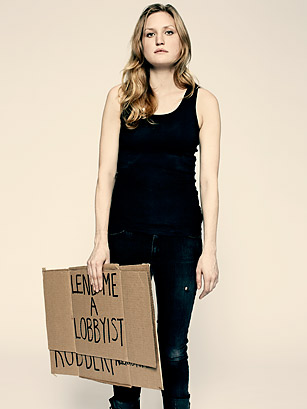
(2 of 2)
It was a really galvanizing moment. A million and a half people watched it on YouTube. People told me, "I saw these women getting assaulted on YouTube, and it brought me down to the park." How does that feel?
It's really amazing; it's extremely humbling, because I really didn't do anything special, but I'm so happy to have the opportunity to be part of this movement, and I'm happy that something like that ... I'm happy to get maced if it helps the movement. I'd do it again. [Laughs] And I'm happy to be a voice, and it's really humbling to hear people say that.
What is it about this movement that's different from other protests, that you would be willing to get pepper-sprayed for this particular cause?
I think it's really important that the movement is leaderless and that all these people are encouraged to be autonomous. It's really a movement for everyone. What we're trying to change, the system itself, these are things that will affect my children if I ever have any, and this affects my grandparents. It's about everyone. And as the economy gets worse and worse, I feel like I've been quiet and distracted, or trying to distract myself from things for so long that it's almost like a breath of fresh air to get to go outside and scream about it, and talk about it, politely.
What do you see as the next step? Do you think it should become involved in politics or stay clear of politics altogether?
I feel like the economic situation and politics go hand in hand. One of the huge problems is money and corporate involvement with government. So obviously politics is something that definitely needs to be changed. As far as the movement specifically, I feel like at this point in time, our biggest goal is to spread and to wake up America to want to contact their politicians, and to get people to care and to realize that they have a voice and empower them. I feel like that's kind of the step right now. It's gotten so big so fast, and there's so many different levels of ways people are becoming involved with it, that it's kind of hard to see what the specific next steps should be. But for right now, it is that it grows, which is important if we're ever going to affect politicians.
What about your future plans?
I'm working on starting a working group that will help people stay safe and warm this winter. And other than that, I've been trying to learn as much about finance and our government and the economy as possible, and just talking to as many different sources to understand what happened.
Is there anything else you want people to know about the movement, your experience, what you'd like to see for this country?
Everyone I talk to, when I tell them about the movement, they're so — they're interested, but they're all so hopeless. And everyone's just already given up. And I feel very differently. I feel this is an amazing time to be alive in America — at this point we actually have the opportunity for change, in this moment of destruction. So I feel like there's a great chance to rebuild, and I hope people get involved and realize that our economy is not the way that it is because of a change in wind, it's because of wrongdoing on our government and very powerful businessmen's part.
In a new book from TIME, What Is Occupy? Inside the Global Movement, our journalists explore the roots and meaning of the uprising over economic injustice. To buy a copy as an e-book or a paperback, go to time.com/whatisoccupy.